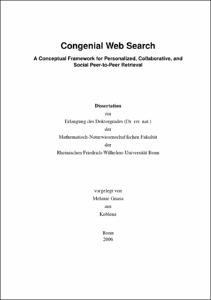Gnasa, Melanie: Congenial Web Search : A Conceptual Framework for Personalized, Collaborative, and Social Peer-to-Peer Retrieval. - Bonn, 2006. - Dissertation, Rheinische Friedrich-Wilhelms-Universität Bonn.
Online-Ausgabe in bonndoc: https://nbn-resolving.org/urn:nbn:de:hbz:5N-08846
Online-Ausgabe in bonndoc: https://nbn-resolving.org/urn:nbn:de:hbz:5N-08846
@phdthesis{handle:20.500.11811/2679,
urn: https://nbn-resolving.org/urn:nbn:de:hbz:5N-08846,
author = {{Melanie Gnasa}},
title = {Congenial Web Search : A Conceptual Framework for Personalized, Collaborative, and Social Peer-to-Peer Retrieval},
school = {Rheinische Friedrich-Wilhelms-Universität Bonn},
year = 2006,
note = {Traditional information retrieval methods fail to address the fact that information consumption and production are social activities. Most Web search engines do not consider the social-cultural environment of users' information needs and the collaboration between users. This dissertation addresses a new search paradigm for Web information retrieval denoted as Congenial Web Search. It emphasizes personalization, collaboration, and socialization methods in order to improve effectiveness.
The client-server architecture of Web search engines only allows the consumption of information. A peer-to-peer system architecture has been developed in this research to improve information seeking. Each user is involved in an interactive process to produce meta-information. Based on a personalization strategy on each peer, the user is supported to give explicit feedback for relevant documents. His information need is expressed by a query that is stored in a Peer Search Memory. On one hand, query-document associations are incorporated in a personalized ranking method for repeated information needs. The performance is shown in a known-item retrieval setting. On the other hand, explicit feedback of each user is useful to discover collaborative information needs. A new method for a controlled grouping of query terms, links, and users was developed to maintain Virtual Knowledge Communities. The quality of this grouping represents the effectiveness of grouped terms and links. Both strategies, personalization and collaboration, tackle the problem of a missing socialization among searchers.
Finally, a concept for integrated information seeking was developed. This incorporates an integrated representation to improve effectiveness of information retrieval and information filtering. An integrated information retrieval process explores a virtual search network of Peer Search Memories in order to accomplish a reputation-based ranking. In addition, the community structure is considered by an integrated information filtering process. Both concepts have been evaluated and shown to have a better performance than traditional techniques. The methods presented in this dissertation offer the potential towards more transparency, and control of Web search.},
url = {https://hdl.handle.net/20.500.11811/2679}
}
urn: https://nbn-resolving.org/urn:nbn:de:hbz:5N-08846,
author = {{Melanie Gnasa}},
title = {Congenial Web Search : A Conceptual Framework for Personalized, Collaborative, and Social Peer-to-Peer Retrieval},
school = {Rheinische Friedrich-Wilhelms-Universität Bonn},
year = 2006,
note = {Traditional information retrieval methods fail to address the fact that information consumption and production are social activities. Most Web search engines do not consider the social-cultural environment of users' information needs and the collaboration between users. This dissertation addresses a new search paradigm for Web information retrieval denoted as Congenial Web Search. It emphasizes personalization, collaboration, and socialization methods in order to improve effectiveness.
The client-server architecture of Web search engines only allows the consumption of information. A peer-to-peer system architecture has been developed in this research to improve information seeking. Each user is involved in an interactive process to produce meta-information. Based on a personalization strategy on each peer, the user is supported to give explicit feedback for relevant documents. His information need is expressed by a query that is stored in a Peer Search Memory. On one hand, query-document associations are incorporated in a personalized ranking method for repeated information needs. The performance is shown in a known-item retrieval setting. On the other hand, explicit feedback of each user is useful to discover collaborative information needs. A new method for a controlled grouping of query terms, links, and users was developed to maintain Virtual Knowledge Communities. The quality of this grouping represents the effectiveness of grouped terms and links. Both strategies, personalization and collaboration, tackle the problem of a missing socialization among searchers.
Finally, a concept for integrated information seeking was developed. This incorporates an integrated representation to improve effectiveness of information retrieval and information filtering. An integrated information retrieval process explores a virtual search network of Peer Search Memories in order to accomplish a reputation-based ranking. In addition, the community structure is considered by an integrated information filtering process. Both concepts have been evaluated and shown to have a better performance than traditional techniques. The methods presented in this dissertation offer the potential towards more transparency, and control of Web search.},
url = {https://hdl.handle.net/20.500.11811/2679}
}






